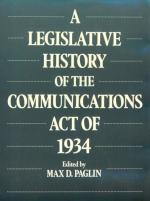|
This section contains 2,527 words (approx. 9 pages at 300 words per page) |

|
The Communications Act of 1934 is the major, comprehensive legislation for the regulation of all nongovernmental wire and wireless telecommunication. It outlines specific laws that telecommunications operators must follow. It created the Federal Communications Commission (FCC) and enabled the commissioners to initiate further regulations that carry out the intent of the act. Most important, the act justifies the regulation of telecommunications, which is paradoxical, given the rights that are guaranteed to the press by the First Amendment.
Evolution of the Act
The Communications Act of 1934 grew out of the Radio Act of 1927, which was the first official attempt by the U.S. government at a comprehensive legislation for radio. The Radio Act of 1927 was passed by the U.S. Congress to help the U.S. Department of Commerce solve interference problems connected with the burgeoning number of new operating stations. Although this act gave First...
|
This section contains 2,527 words (approx. 9 pages at 300 words per page) |

|


